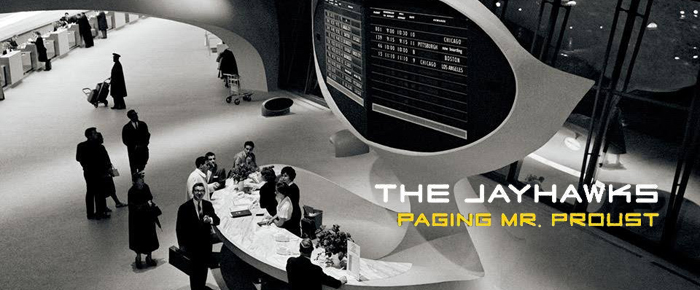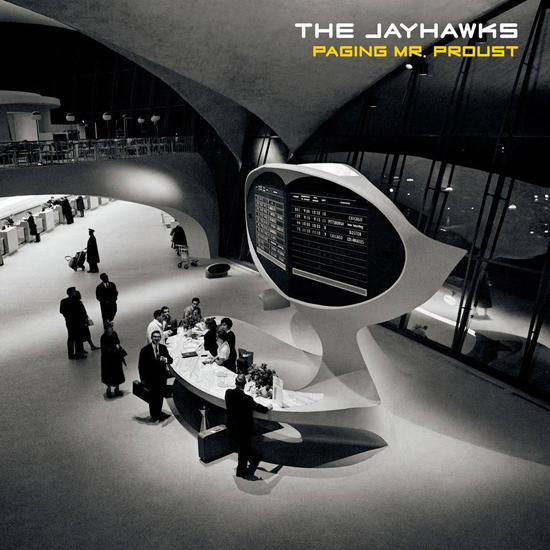
By Eleni P. Austin
What might have happened if John Lennon had quit the Beatles and Paul, George and Ringo carried on without him? In 1969 he briefly left the Fab Four, but was persuaded to return. Only to have Paul McCartney very publically jump ship a few months later, (irritating the shit out of John), and effectively ending an era.
But what if the other three had continued, sort of burnishing the brand name, rather than starting from scratch with other musicians or as solo artists? Would they have been feted as a trio? It’s an interesting hypothetical scenario. It’s also what kinda-sorta happened with the Jayhawks.
In the early ‘80s, bands like Rank & File, Jason And The Scorchers and the Long Ryders were influenced equally by Country and Punk, co-opting the two genres, the hybrid fermented as “Cow-Punk.” By the end of that decade, the Jayhawks, along with Uncle Tupelo refined and expanded that sound, adding Roots-Rock, Bluegrass, Honky Tonk and Folk, creating alt.country (sometimes known as Americana).
The Jayhawks formed in Minneapolis, Minnesota in 1985. During the ‘80s, the thriving Twin Cities music scene was home to disparate artists like Prince and Husker Du. The nucleus of the band, Mark Olson, (acoustic guitar and vocals), Gary Louris (electric guitar and vocals), and Marc Perlman (bass), had made their bones in Rockabilly or Punk bands. Their original drummer, Norm Rogers, was replaced by Thad Spencer and later Ken Callahan. Initially, Mark Olson was their primary songwriter. Their self-titled debut was released in 1986 through the tiny indie label, Bunkhouse.
Three years elapsed before they completed their sophomore effort, Blue Earth. In the interim, Gary Louris briefly left the band and was involved in a serious car accident. When he returned, he had more of a hand in songwriting. Blue Earth was released by Twin-Tone, the venerable Minneapolis label known for breaking local bands like the Replacements and Soul Asylum. The record gained a little traction, even grandiloquent Pop critic Robert Cristgau drawing favorable comparisons to the Flying Burrito Brothers.
Ironically, while producer George Drakoulias was on the phone with Twin-Tone, he heard Blue Earth playing in the background and inquired about the band. Aside from being a producer, he was an A&R executive for Rick Rubin’s American label, His real claim to fame was discovering, nurturing and signing the Black Crowes, who had broken through back in 1990, adding some much needed Rock cred to Rubin’s new label. He immediately signed the Jayhawks and got them back in the studio. The result, Hollywood Town Hall, was released in early 1992.
This was the album that put the Jayhawks on the map. Critical acclaim was unanimous. Arriving at the height of the Grunge era, it was rustic Country comfort, the complete obverse of the flannel-clad angst emanating from the Pacific Northwest. Their music hinted at antecedents like Buffalo Springfield and Gram Parsons without ever sounding derivative. Videos for “Waiting For The Sun” and “Settled Down Like Rain” even managed to gain a foot-hold on MTV. By the time the band returned with their fourth record, Tomorrow The Green Grass, in 1995, they seemed poised for greatness.
…Green Grass was even more self-assured. Songs like “Blue” and “I’ll Run Away,” added depth and joie de vivre. “Miss Williams’ Guitar” was an exuberant paean to Mark Olson’s bride, singer-songwriter Victoria Williams. Ken Callahan had left the band and ex-Lone Justice drummer Don Heffington played on the record, (he would be supplanted on the road by new and permanent drummer, Tim O’Reagan). A welcome feminine voice was added to the band when Karen Grotberg joined on keys.
The Jayhawks toured relentlessly behind the record, but they still didn’t break through commercially. It was a tipping point for Mark Olson who had been at it now for 10 years. He quit the band, partly to stretch his wings creatively, but more importantly, to plant roots with Vic in their new home in Joshua Tree and be on hand to meet the challenges posed by her Multiple Sclerosis. (She had been diagnosed following a tour opening for Neil Young). He went on to make music with Vic in Original Harmony Creekdippers as well as a series of well-received solo albums.
Gary Louris and the band soldiered on, releasing the Psychedelic-tinged Sound Of Lies in 1997, the poppier Smile in 2000 and the rootsier, mostly acoustic Rainy Day Music in 2003. In 2005 the Jayhawks took an extended break. Louris recorded Vagabonds, his solo debut in 2008. Less than a year later, he rekindled his partnership with Mark Olson and they recorded a duo album together entitled Ready For The Flood.
Later in 2009 the Jayhawks, including Olson, quietly reunited for two shows, one in Barcelona, Spain, the other in their hometown. The American label had released Music From The North Country, a career retrospective. Soon Olson was officially back in the fold and the band was back on the road. A contingency for his return was that if he left, the Jayhawks would never record or tour without him. In 2011 they released their eighth album, Mockingbird Time. A tour followed, (including a Stagecoach set), and that’s when the shit hit the fan.
Olson and Louris had a bitter falling out, fueled partly by Louris’ addiction to pain medication, (he has since sought treatment), songwriting credits and money issues. The pair nearly came to blows, and Olson vowed to never perform with Louris or the Jayhawks again. He returned to his solo career releasing the Goodbye Lizelle album in 2015.
 Gary Louris never publicly addressed Mark Olson’s statements, but he reconvened the Jayhawks and went back on tour, invalidating the agreement they had struck before reuniting. Soon the band was back in the studio, recording what would be their ninth album, Paging Mr. Proust. Production chores were handled by Peter Buck, guitarist and sound architect for R.E.M. and producer/musician Tucker Martine who has been behind the board for myriad indie releases, most recently, case/lang/viers, Decemberists and Modest Mouse.
Gary Louris never publicly addressed Mark Olson’s statements, but he reconvened the Jayhawks and went back on tour, invalidating the agreement they had struck before reuniting. Soon the band was back in the studio, recording what would be their ninth album, Paging Mr. Proust. Production chores were handled by Peter Buck, guitarist and sound architect for R.E.M. and producer/musician Tucker Martine who has been behind the board for myriad indie releases, most recently, case/lang/viers, Decemberists and Modest Mouse.
The album opens tentatively with the jangly thump of “Quiet Corners & Empty Spaces.” Louris’ melancholy tenor connects with sprightly guitar, sunshiny keys and a steady back-beat. Surprisingly breezy lyrics promise “the start of a brand new adventure.” They also advocate a carpe diem philosophy. Rather than focus on day-to-day minutiae we should focus on the bigger picture; “we drown in up’s and down’s neglecting/The beauty of our sun is setting.”
The next three tracks have a decidedly late ‘60s/early ‘70s A.M. radio vibe. The candy-coated crunch of “Lost In The Summer” is powered a stutter-step rhythm, plangent piano notes and day-glo guitar licks that get fuzzier as the song progresses.
At first glance, the lyrics seem to bemoan our inability to leave our worries behind; “You’re lying there hating everything you cannot control/You roll around push it down, light up, smoke another bowl.” But upon closer examination, it feels like the desperate manifesto of a would-be mass murderer; “Freedom to believe in something that you cannot understand/ freedom to cradle a pistol in the palm of your hand.” The imagery is unsettling.
Sun-dappled acoustic guitar opens “Lovers Of The Sun.” As the tempo gathers speed, Louris and Karen Grotberg’s harmonies lattice over the melody. It’s a paean to one of those sun-kissed ‘70s girls, (maybe the kind who dared to skateboard while wearing a maxi-pad).
If the Association, Neil Young and Crazy Horse and the Velvet Underground ever collaborated on a song, it might sound like “Pretty Roses In Your Hair.” Opening with an insistent trap-drum tattoo, the tune is accented by stately piano runs and shuddering, almost skronky guitar. Here Louris and Grotberg’s honeyed harmonies nearly camouflage bummer lyrics that dredge the ashes of an old relationship. The urgent “bong-bong-bong” lyrics that follow the chorus recalls the late Lou Reed’s seminal “Satellite Of Love.”
Both “Devil Inside Her Eyes” and “Leaving The Monsters Behind” are a study in contrasts. The former opens with a rumbling guitar note, along with chunky bass lines, an off-kilter rhythm and ragged harmonica fills. The dusty melody shares some musical DNA with Tom Petty’s “Last Dance With Mary Jane.” The solipsistic lyrics name-check author David Foster Wallace, but the real delight is the instrumental break that spotlights prickly power chords and more high-lonesome harmonica.
The latter is more easygoing, even though barbed lyrics go to great lengths to avoid a domestic dispute; “I don’t want to fight, giving it up, screaming at midnight/I don’t want to fight, seems there’s no place to hide.” Ticklish acoustic arpeggios and ricochet rhythms cantilever the see-saw melody. Suddenly the whole enterprise turns on a dime, downshifting as Louris rips a roughhewn solo.
Other interesting tracks include the sparkling Country of “Isabel’s Daughter” and the brittle “Comeback Kids.” The only glaring misstep here is the incongruous tone poem of “Ace.” The album closes with the sweet and sour triptych of “The Dust Of Long Dead Stars,” “Lies In Black & White” and “I’ll Be Your Key.”
“Dust…” pivots on a nimble little guitar figure and a breakneck beat. Sly, observational humor unspools over one too many cocktails; “Nurse another cheap Old-Fashioned, the floor is streaked with dreams and beer…the existential biker waitress, Betty Page without the bangs.” Grotberg’s rollicking piano propels the action, jockeying for position with Louris’ stripped-down rhythm guitar riffs and his stinging solo.
“Lies…” is probably the album’s most potent track, threading sinewy guitar, roiling bass and quiescent piano into a rich, mellifluous tapestry. Louris adopts the pose of the plaintive plaintiff, venting his vitriol toward Mark Olson in a series of devastating couplets. “..Your words are twisted and bitter, you duplicitous quitter, you once said ‘you’d make a good Christian,’ I laughed ‘how would you know’ with your hate in tow/And your lies, lies in black and white.” It recalls “How Do You Sleep,” John Lennon’s withering rebuke of Paul McCartney.”
The album closes with “…Key,” a surprisingly unabashed love song. Completely devoid of the acrimony that permeates even the sunny songs here, it’s pared down to Louris’ nearly falsetto tenor, a synth-y string section and spare acoustic guitar. An oddly optimistic end to a great record.
Paging Mr. Proust is kind of like Jayhawks 101, offering a Whitman’s sampler of their myriad styles, Country Rock, Psychedelia, Pop and unadorned acoustic music all get a turn in the spotlight. Gary Louris’ lonely voice blends sweetly with Karen Grotberg’s high harmonies, but longtime fans will miss the symbiotic disharmony Louris created with Mark Olson. Sadly, those days seem long gone.










































